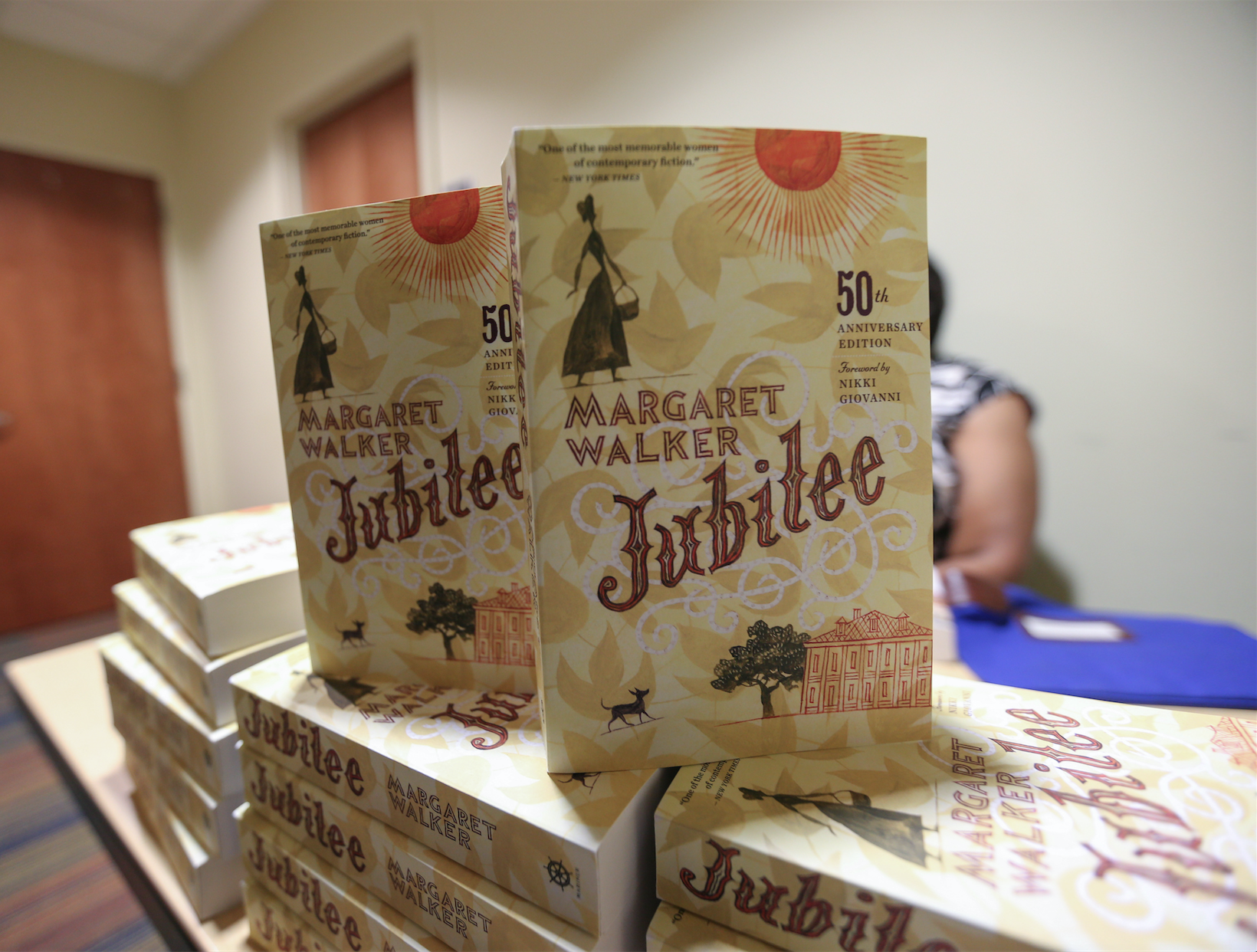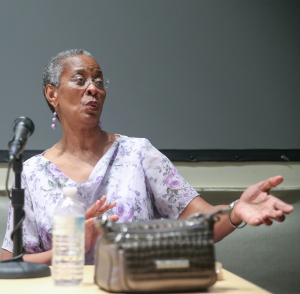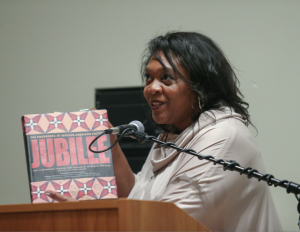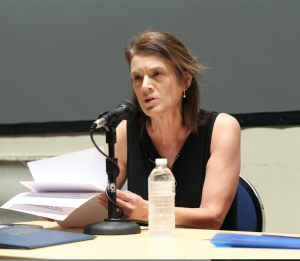
[hr]
![]()
“And even if “Jubilee” were never considered an artistic or commercial success, I would still be happy just to have finished it,” noted author, poet and educator Dr. Margaret Walker (Alexander) once said.
And 50 years later, Jackson State University’s celebration of the anniversary of “Jubilee” is a testament to the magnitude of the 1966 groundbreaking novel’s literary impact and its ability to transcend time and class, making the historical slave narrative still relevant in 2016.
“Margaret Walker’s legacy is as important today as it ever was,” said Dr. Robert Luckett, director of the JSU Margaret Walker Center.

“We’re talking about a person who publishes the story of her grandmother and great-grandmother surviving slavery, making it to freedom through emancipation and into the era of reconstruction, facing overwhelming hardship and tragedy. It’s a story of perseverance through tragedy,” he said.
On Friday, Sept. 16, The Margaret Walker Center and the National Endowment for the Humanities through the Mississippi Humanities Council commemorated “Jubilee” by holding a symposium comprised of literary scholars – Dr. Alferdteen Harrison, former director of the Margaret Walker Center; Dr. Trudier Harris, Dr. Carolyn Brown, and Dr. Althea Tait with Dr. RaShell Smith-Spears serving as host.

(Photo by Charles A.Smith/JSU)
“Walker was a foremother in embracing the South as home, in embracing the South as a rich territory for a literary imagination, for embracing the South and saying, ‘yes, I love the South in spite of its violence; yes, I love the South in spite of its ugly history; yes, I will cast down my bucket in the South and live here and produce here and eventually you folks are going to love me for having done so,’ and this is exactly what she did,” said Harris, a professor and researcher at the University of Alabama.
Describing “Jubilee” as a paradigm for African-American writers who would later pen similar stories steeped in Southern historical context, Harris staunchly rattles off a lengthy list of authors, as a reference, ranging from Toni Morrison and Octavia Butler to J. California Cooper and Dolen Perkins-Valdez, who published “Wench” in 2010.
“Today we routinely applaud Margaret Walker as being the foremother of, or the inaugurator of, what we identify as the neo-slave narrative tradition,” said Harris, who is also a literary and culture critic of southern African American identity and experience.
Walker’s influence was far-reaching, touching people like Shanna Smith, a visiting assistant professor in the university’s English Department who exclaimed, “She’s very pivotal to my work.”
“I read ‘Jubilee’ when I was 17 years old, and I stumbled upon it in the library in Kentucky in a place where there were not black teachers, often times, for me,” Smith said.

(Photo by Charles A. Smith/JSU)
“Her story was something I remembered, and it was something so important to me even when I didn’t realize it in my development as a scholar and a writer myself,” she concluded.
An expert on black female writers, Tait, explained how the depiction of a woman washing the feet of two women in the book, “The African-American Culture Jubilee” from Harlem’s Schomburg Center for Research in Black Culture, illustrates Walker’s character of service.

(Photo by Charles A. Smith/JSU)
“When you think about Walker’s legacy; she is the daughter of a philosopher, theologian and clergyman and what that tradition of washing feet is about – it’s about service,” said Tait, who is also an assistant professor of English at the College of Brockport in New York.
Recalling in 1973, when Walker organized the Phillis Wheatley Poetry Festival in order to lend voice to the neglected and ignored black female poets of the time, Tait added “There is no sanitizing her legacy. She was feisty. She knew who she was, and she didn’t let anyone or life beat that out of her. But, she had this amazing ability to tame any type of hubris where she could just serve people.”
For some who may have believed that the Houghton Mifflin prize-winning “Jubilee” propelled the wife and mother beyond racial lines, Brown, who authored the Margaret Walker biography “Song of My Life,” quotes Walker in a 1991 interview as saying: “My Southern salesman said if I were a white woman writing that book I would be a rich woman. He went to a bookstore in Atlanta to get them to have an autograph party, but when they discovered I was black, they told him no.”
Even more perplexing, but reflective of the struggles Walker encountered while trying to preserve and benefit from her work, was, as Brown points out, the loss of her copyright infringement lawsuit against Alex Haley that stemmed from “significant parallels between ‘Jubilee’ and Hayley’s ‘Roots’ (that) led her to believe that he had stolen her work.”

(Photo by Charles A. Smith/JSU)
Walker’s defeat was compounded by the fact that others, after her, sued Haley on the same grounds and won.
Arrison Martin, a junior at Jackson State, feels galvanized by the symposium, “It taught me a lot about Walker, and it taught me a lot about myself as well. It allowed me to reflect on the things that I believe I can’t do. But knowing what Walker experienced makes me feel like I can do those things. When you look back at what she went through, I look at my challenges and think, ‘how minute they are,’” he said.
Jubilee’s themes of hope, faith, love, forgiveness and tenacity amid strife could not be contained in the racial, gender and economic pitfalls that Walker suffered. Instead, “Jubilee” and Walker’s life continue to inspire many and remain a poignant example of the resilience that flourishes in a world fraught with limitations.
“Jubilee is not just for an age but for all time. The appeal and relevance will always be fresh. It’s universal,” Harrison said.






